Categories: AboutUkraine
Date: May 10, 2007
Title: Victory Day Celebration
![]()
There are dates and events in the life of the country that are memorable to every Ukrainian citizen. One of the most memorable dates is the Victory Day...
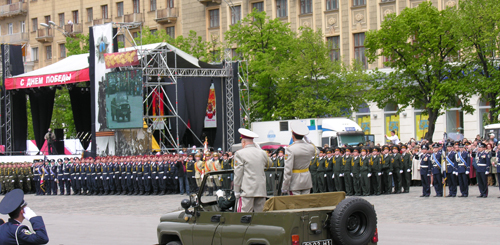
There are dates and events in the life of the country that are memorable to every Ukrainian citizen. One of the most memorable dates is the Victory Day, which commemorates the capitulation of Nazi forces to the Allies (the Soviet Union, the United Kingdom, the United States, Canada and other principal Allied nations) and honors 20 million Soviet people who died in the war.
It is celebrated in the successor states to the Soviet Union on May 9, because when the German Instrument of Surrender was signed (at midnight), it was already May 9 in the USSR and Eastern Europe. The US, UK and most western European countries mark Victory in Europe Day on May 8.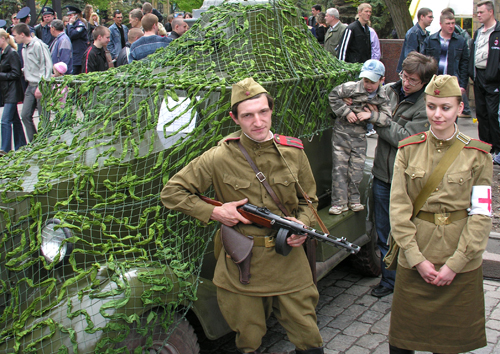
Though Victory Day is strongly associated with the Soviet time, it is a celebration that no citizen can miss. After more than 15 years of independence, the Soviet epoch still lives in the memory of the Ukrainian nation. Each family has bitter memories of that war, and today, the main reason for the celebration of Victory Day is to remember those who died in the war. Each of those who did not fight during the war, had to work for the military economy, which wasn't much easier than fighting. They too are honored on Victory Day.
This year the celebration was not as grand as in previous years – possibly, because of political instability in Kyiv, or due to heavy rains all over the country. Those who tried to «politicize» the event this year, failed, and smiling people got out to the streets with friendly faces, to give their children lessons in history and courage.
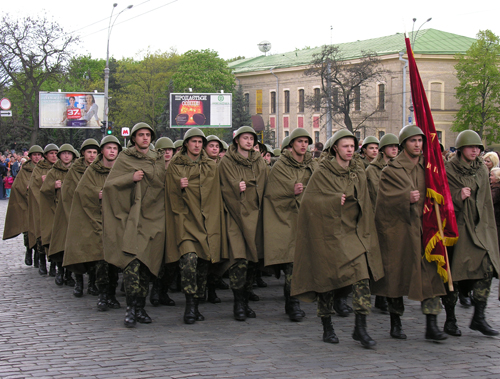 Since 1946, no Victory Day is celebrated without parades, concerts, meetings, military scholarships and commemorative medals for veterans. This year's military parade was certainly not as pompous as the parades of the Soviet time, which were intended to stress the military power of the Soviet Union. Soldiers dressed in World War II vintage uniforms, were followed by war-time vehicles moving slowly along central streets of cities, being encouraged with the applause of spectators and numerous clicks of photo cameras.
Since 1946, no Victory Day is celebrated without parades, concerts, meetings, military scholarships and commemorative medals for veterans. This year's military parade was certainly not as pompous as the parades of the Soviet time, which were intended to stress the military power of the Soviet Union. Soldiers dressed in World War II vintage uniforms, were followed by war-time vehicles moving slowly along central streets of cities, being encouraged with the applause of spectators and numerous clicks of photo cameras.
This year marked the 57th anniversary – one of the last celebrations that those who took part in World War II will live to see. It is the biggest holiday for veterans and pensioners, who could not fail to see the terroors of the war. For some, this day of celebration is clearly a half-century tradition connecting them with the people and memories of long ago. For veterans of The Great Patriotic War wearing medals and ribbons undoubtedly brings with it memories of past suffering and death but also of true heroism in defense of their homeland. Everywhere in the street you can meet the old veterans wearing their uniforms with all their medals, or their suit jackets with all their awards and ribbons. They greet each other with the enthusiasm of partners in a shared past.
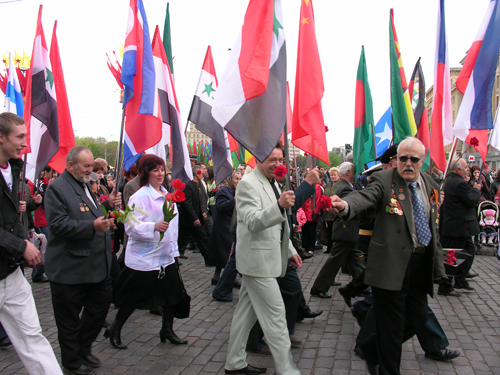 In all the cities there are meetings in which a leader or the mayor of the city gives speeches about the achievement of people in the war and the veterans tell about their adventures in the war. Many people go to military cemeteries and memorials to take flowers to the monuments and show their respect and appreciation to those who defended their Motherland by the cost of their lives.
In all the cities there are meetings in which a leader or the mayor of the city gives speeches about the achievement of people in the war and the veterans tell about their adventures in the war. Many people go to military cemeteries and memorials to take flowers to the monuments and show their respect and appreciation to those who defended their Motherland by the cost of their lives.
This day has turned into a solemn commemoration of the 2,5 million Ukrainians who died serving in the Red Army, and of the thousands who were massacred at Babyn Yar as well as the millions of Ukrainians who died as victims of the war and in German concentration camps. The focus is widened further to include the heroism of the Ukrainian Insurgent Army in its fight against both the Nazis and the Soviets and in remembrance of the hundreds of thousands of its freedom fighters who died in the forest and mountains of western Ukraine.
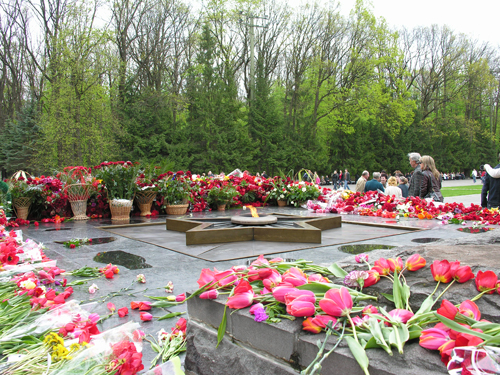 The holiday represents what the Ukrainian nation has lived through. The Soviet Union played a decisive role in the victory over Hitler's war machine.
The holiday represents what the Ukrainian nation has lived through. The Soviet Union played a decisive role in the victory over Hitler's war machine.
In Kyiv, about 3,000 veterans strolled down Kyiv's main street, the Khreschatyk, surrounded by their families and loved ones. Children, able to recognize veterans by the rows of Soviet medals on their jackets, greeted the heroes with bright red roses. Marching bands played Red Army anthems and children pranced about in Ukrainian folk costumes.
At the parade's helm marched Ukrainian President Viktor Yushchenko, Prime Minister Yulia Tymoshenko and other leading government figures. "For 60 years, the May 9 holiday has been a mixture of grief and joy," Mr. Yushchenko said. "For four years of war, Ukraine paid 10 million lives of its sons and daughters for our freedom and the right to live on our land. This 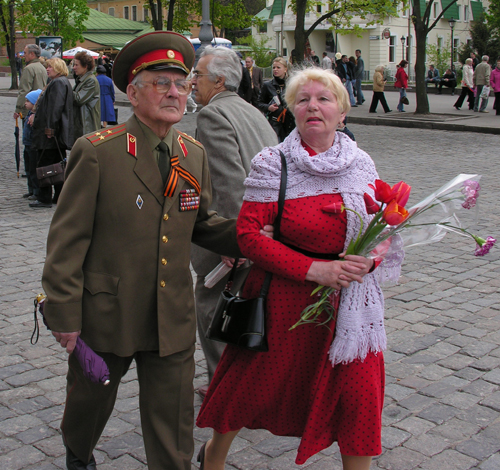 is a very big price to live freely on your independent land."
is a very big price to live freely on your independent land."
Unlike his predecessors, Mr. Yushchenko did not shy away from addressing the UPA veterans. Nor did he refraining from addressing the rift in Ukrainian society that has been a painful and divisive matter for the millions still alive in Ukraine who lived through the horrendous second world war. In fact, during the afternoon, as Red Army veterans celebrated in Kyiv's center, Ukraine's 24-hour news station Channel Five aired the UPA documentary, "Between Hitler and Stalin - Ukraine in World War II."
"In our hearts, we forgave the Germans, the Japanese, the Poles, we forgave everyone possible on the other side of trenches," Mr. Yushchenko told the crowd. "We just haven't been able to forgive each other. Veterans of the Great Patriotic War, unfortunately, have yet to extend their hands to UPA veterans... I know just how difficult this process is. ... But I am asking you, veterans, I am taking my hat off and begging you to offer your hands to each other. This is necessary for the future of Ukraine ... so that we can show that everything is all right in Ukrainian society," he said.
Every major Ukrainian city held public festivities and ceremonies to honor the World War II veterans. Even in Lviv, Ukraine's stronghold of nationalism, oblast government officials, city council members and army commanders placed flowers on the graves of Soviet soldiers buried at Kholmy Slavy, Interfax reported. Afterwards, the government leaders visited a hospital for disabled war veterans to honor them and give valuable gifts.Lviv's Russian Cultural Center organized a panakhyda at Marsov Field in honor of the fallen Red Army soldiers on the morning of May 9, as well as a ceremony to place flowers at the soldiers' graves. Article written by Natasha Kamenskaya; photos by Paul Farley.
Read related articles about holidays in Ukraine:
March 8-th - Women's Most Special Day